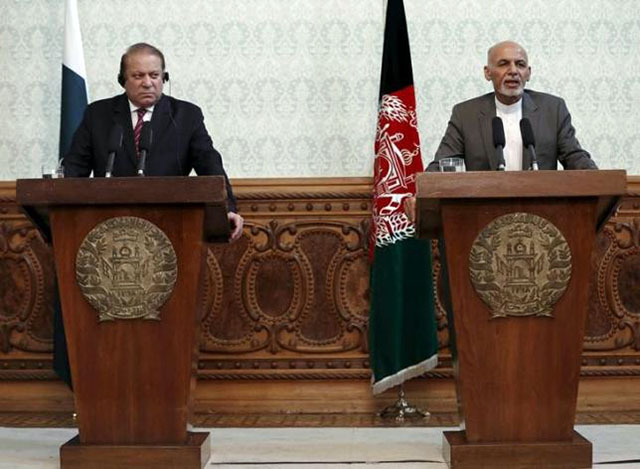Amidst the heightening degree of resentment between two neighboring countries over security matters –the exercise of warmth and willingness displayed by Pakistani prime minister, Muhammad Nawaz Sharif while talking to Afghan delegation led by Finance minister Eklil Hakimi who recently visited Pakistan the attend the 10th session of Pakistan-Afghanistan Joint Economic Commission, reported asserting the essence of ‘peaceful and prosperous’ neighborhood and its readiness to help Afghanistan in its quest for peace and development.
Pakistan going through security operation in its troubled tribal areas is said to have pushed enormous militants on the western side of border that have had multiplied Afghan security woes –something Afghan centric issue.
Following the signature of several security agreements with US and NATO states the Afghan government has to pressurize them for their impartial role improving worsening security matters. Earlier, the top American senators JonMcCain, in meeting with Pakistani Chief of Army Staff has sought cooperation from the Pakistan Army to win this war in Afghanistan. On the other hand US Vice-President Joe Biden and Gen. Raheel Sharif called for the early resumption of the stalled peace talks between the Afghan government and the Taliban.
Nonetheless, after overtake of strategically significant province of Kunduz, Taliban’s credibility came to question. Reportedly, Taliban have had executed handsome deal of atrocities and deliberate human rights violation which can not be justified on any moral ground. It was only then many political figures came forth denouncing Taliban outlasting bloodshed whilst ruling out the likelihood of any peace talks but only from position of strength. On the other hand infighting between Taliban for leadership issue, between Taliban and ISIS over political dominance and gain of legitimacy is no surprise. The difference of opinion led to eruption of clashes between Taliban second rank leaders. Contrary to Taliban infighting, they are also confronting Daesh on several fronts in Nangarhar province at present. The fight continues unless one’s dominance is accepted by the other. In the land of atrocities, Taliban were already flexing their muscle for greater share in Afghanistan politics –the space decade long war between coalition forces and Taliban produced is eventually filled by militants of Daesh. Reportedly, Taliban and Daesh are fighting for pressing their opponent. A recent report released by the Pentagon in Washington D.C. states that Daesh is expanding in Afghanistan and preparing to confront the Taliban. According to the report, the Taliban are also monitoring Daesh’s activities, and the two groups have already faced off in confrontation on several occasions. For now, however, the battle against Daesh in Afghanistan is predominately taking place on a local, provincial level. In order to draw greater focus on changing political scenarios, Taliban recently sent a highly-publicized letter to Daesh leaders emphasized that there is no need for a new front in Afghanistan.
Realistically, the infighting earns mere human causalities as long as the blood conflict goes undecided. It depicts Taliban endeavoring to expand the territory of their rule, or exercising power display to make the government submit to their terms when the peace talks gains momentum. More or less prior to winning the heart and mind of masses the territorial gains can not be equated as a major gain. It can be assessed; even if Taliban succeeds securing lion’s share in the jumpstarted peace talks, the fair exercise of ballot may not head them to assemblies.
Putting a glance at the political outlook of Afghanistan, chaotic state of delusion is reflected. The incumbent government tries to push for peace talks whilst insurgents resorted to parallel bloodletting must be kept in consideration. It is believed that lasting can only be installed given all factions of the decade long conflict is brought to common terms. The most significant are the demonstration of shift instilled in Taliban’s resolve to disband militancy, dissociate Al-Qaida and holistically surrender to constitution of the country. This move practically is achievable indefinitely however Taliban deems to having upper hand in the fight, never surrender to government’s demands instead dreams of government surrendering to their demand. Customarily, the government is left to either wipe out or should talk to Taliban –tempting to install outlasting peace in Afghanistan. The U.S. government, for its part, has seemingly taken steps to facilitate negotiations between the Afghan government and the Taliban by bridging the gap between Afghanistan and Pakistan. In the light of established nexus found between Afghan Taliban and Pakistan, could be persuaded to play vital role in persuading Taliban to reconnect the Murre peace talks. The international community got to find out some pragmatic means of border security issues. For instance the military operation in tribal areas of Pakistan is deemed to have pushed a major series of global terrorist networks is the concern expressed by president Ghani. Obama confirmed by stating the Al-Qaida affiliates are pushed into Afghanistan in the wake of military operation in tribal areas of Pakistan. In order to do away with this very problem Afghanistan should increase its surveillance at the borders areas and movements of individual should be closely checked. The US can help Afghanistan in getting out of the said emerging woes of infiltrating Taliban and ISIS. Both the countries should not let terrorist use its border areas for vested interest of other. In spite of altering relation between the two countries Pakistan’s role in reviving the peace talks seems unarguably essential.

